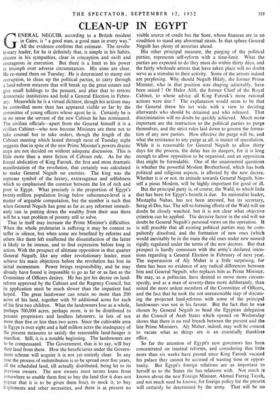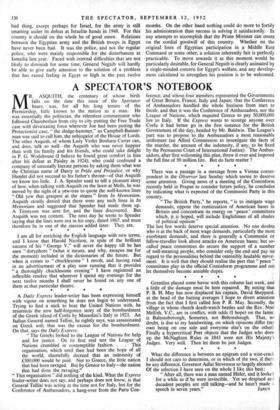CLEAN-UP
IN EGYPT GENERAL NEGUIB, according to a British resident in Cairo, is " a good man, a good man in every way." All the evidence confirms that estimate. The revolu- tionary leader, for he is definitely that, is simple in his habits, sincere in his sympathies, clear in conception and swift and courageous in execution. But there is a limit to his power to triumph over adverse circumstances. His aims are clear. He re-stated them on Tuesday. He is determined to stamp out corruption, to clean up the political parties, to carry through a land-reform measure that will breakup the great estates and give small holdings to the peasant, and after that to restore democratic institutions and hold a General Election in Febru- ary. Meanwhile he is a virtual dictator, though his actions may be controlled more than has appeared visible so far by the committee of young officers whose agent he is. Certainly he is in no sense the-servant of the new Cabinet he has nominated. The civilian officials—apart from the General himself it is a civilian Cabinet—who now become Ministers are there not to take counsel but to take orders, though the length of the Cabinet meeting which lasted through most of Tuesday night suggests that in spite of the new Prime Minister's powers drastic steps are not decided on without adequate discussion. This is little more than a mere fiction of Cabinet rule. As for the forced abdication of King Farouk, the first and most dramatic manifestation of the revolution, that certainly was calculated to make General Neguib no enemies. The king was the supreme symbol of the luxury, extravagance and selfishness which so emphasised the contrast between the lot of rich and poor in Egypt. What precisely is the proportion of Egypt's twenty-million population living below subsistence-level is a matter of arguable computation, but the number is such that when General Neguib has gone as far as any reformer immedi- ately can in putting down the wealthy from their seat there will be a vast problem of poverty still to solve.
That in itself may increase the Prime Minister's difficulties. When the whole proletariat is suffering it may be content to suffer in silence, but when some are benefited by reforms and others like them left unaffected the dissatisfaction of the latter is likely to be intense, and to find expression before long in action. With the prospect of ultimate opposition in that quarter General Neguib, like any other revolutionary leader, must achieve his main objectives before the revolution has lost its initial momentum. Power brings responsibility, and he may already have found it impossible to go as far or as fast as the Committee of Officers desires. He has got his decree on land- reform approved by the Cabinet and the Regency Council, but its application must be much slower than the impatient had hoped. The great landowner can retain no more than 200 acres of his land, together with 50 additional acres for each of his first two children. What the landowners lose as a whole, perhaps 700,000 acres, perhaps more, is to be distributed to peasant proprietors and landless labourers, in lots of not more than five or less than two acres. Since the cultivable area in Egypt is over eight and a half million acres the inadequacy of the present measures to satisfy the reasonable land-hunger is manifest. Still, it is a notable beginning. The landowners are to be compensated. The Government, that is to say, will buy their land from them. How the beneficiaries under the Govern- ment scheme will acquire it is not yet entirely clear. In any case the process of redistribution is to be spread over five years, all the scheduled land, till actually distributed, being let to its previous owners. The new owners must secure loans from somewhere to enable them first to buy the land (for it does not appear that it is to be given them free), to stock it, to buy Implements and other necessities, and there is at present no visible source of credit but the State, whose finances are in no condition to stand any abnormal strain. In that sphere General Neguib has plenty of anxieties ahead.
His other principal measure, the purging of the political parties, represents self-reform with a time-limit. What the parties are expected to do they must do within thirty days, and the fairly wholesale arrests that have taken place will no doubt serve as a stimulus to their activity. Some of the arrests indeed are perplexing. Why should Neguib Hilaly, the former Prime Minister, who in that position was shaping admirably, have been seized ? Or Hafez Afifi, the former Chief of the Royal Cabinet, to whose advice all King Farouk's more rational actions were due ? The explanation would seem to be that the General threw his net wide with a view to deciding afterwards who should be detained and who released. That discrimination will no doubt be quickly achieved. Much more important are the instruction to the political parties to purge themselves, and the strict rules laid down to govern the forma- tion of any new parties. How effective the purge will be, and what the resistance to any purge at all, is matter of speculation. While it is reasonable for General Neguib to allow thirty days for the process, the delay has its dangers, for it is long enough to allow opposition to be organised, and an opposition that might be formidable. One of the unanswered questions is whether the powerful Moslem Brotherhood, which has both political and religious aspects, is affected by the new decree. Whether it is or not, its attitude towards General Neguib, him- self a pious Moslem, will be highly important for good or ill.
But the principal party is, of course, the Wafd, to which little that has been for Egypt's benefit is due. Its nationalist leader, Mustapha Nahas, has not been arrested, but its secretary, Serag el-Din, has. The self re-forming efforts of the Wafd will no doubt be closely watched, but it is not clear what objective criterion can be applied. The decisive factor in the end will no doubt be General Neguib's personal views on the operation. It is still possible that all existing political parties may be com- pulsorily dissolved, and the formation of new ones (which would inevitably be in the main the old ones under new names) rigidly regulated under the terms of the new decrees. But that prospect is hardly consonant with the army's declared inten- tions regarding a General Election in February of next year. The supersession of My Maher is a little surprising, for there has been no evidence of any radical differences between him and General Neguib, who replaces him as Prime Minister. He may, as a politician, have desired to move more circum- spectly, and as a man of seventy-three more deliberately, than suited the more ardent members of the Committee of Officers, and the fact that he took the not unreasonable step of discuss- ing the projected land-reforms with some of the principal landowners was not in his favour. But the fact that he was chosen by General Neguib to head the Egyptian delegation at the Council of Arab States which opened on Wednesday shows that there is no real breach between the present and the late Prime Ministers. My Maher, indeed, may well be content to vacate what as things are is an essentially thankless office.
So .far the attention of Egypt's new governors has been concentrated on internal reforms, and considering that little more than six weeks have passed since King Farouk vacated his palace they cannot be accused of wasting time or oppor- tunity. But Egypt's foreign relations. are as important to herself as to the States she has relations with. Not much is known about the new Foreign Minister, Ahmed Farrag Tayeh, and not much need be known, for foreign policy for the present will certainly be determined by the army. That will be no bad thing, except perhaps for Israel, for the army is still smarting under its defeat at Israelite hands in 1948. For this country it should on the whole be of good omen. Relations between the Egyptian army and the British troops in Egypt have never been bad. It was the police, and not the regular police, who were mainly responsible for the disturbances at Ismailia last year. Faced with internal difficulties that are not likely to diminish for some time, General Neguib will hardly be able to give early attention to the solution of a problem that has raised feeling in Egypt so high in the past twelve months. On the other hand nothing could do more to fortify his administration than success in solving it satisfactorily. In any attempts to accomplish that the Prime Minister can count on the cordial goodwill of this country. Whether on the original lines of Egyptian participation in a Middle East Command or some other, a solution inherently fair is perfectly practicable. To move towards it at this moment would be particularly desirable, for General Neguib is clearly animated by a single-minded concern for Egypt's welfare, and any develop- ment calculated to strengthen his position is to be welcomed.



































 Previous page
Previous page